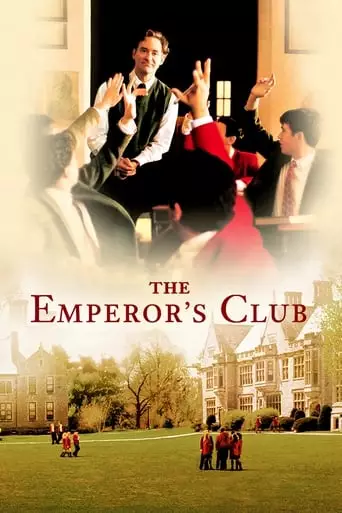William Hundert is a passionate and principled Classics professor who finds his tightly-controlled world shaken and inexorably altered when a new student, Sedgewick Bell, walks into his classroom. What begins as a fierce battle of wills gives way to a close student-teacher relationship, but results in a life lesson for Hundert that will still haunt him a quarter of a century later.
The Emperor’s Club is a 2002 drama directed by Michael Hoffman, featuring Kevin Kline as William Hundert, a dedicated classics teacher at the prestigious St. Benedict’s School for Boys. Set in the early 1970s, the film follows Hundert’s efforts to instill values of honor and integrity in his students.
The narrative centers on Sedgewick Bell (Emile Hirsch), a rebellious student who challenges Hundert’s teaching methods and moral convictions. Despite Sedgewick’s disruptive behavior, Hundert endeavors to guide him, believing in the potential for change. The story unfolds over several decades, highlighting the enduring impact of education and the complexities of teacher-student relationships.
The film explores themes of morality, integrity, and the long-term effects of education. It delves into the ethical dilemmas faced by educators when confronted with students who test their principles. The narrative structure, which spans a quarter of a century, allows for a profound exploration of character development and the consequences of choices made in the formative years.
Main Themes
- Morality and Integrity: The film examines the importance of upholding moral principles, even when faced with personal and professional challenges. It questions whether integrity can be maintained in the face of temptation and societal pressures.
- The Impact of Education: The Emperor’s Club underscores the lasting influence that educators can have on their students, shaping their values and future decisions. It highlights the responsibility of teachers in guiding young minds.
- Redemption and Forgiveness: The narrative explores the possibility of redemption, focusing on whether individuals can change and whether forgiveness is attainable after betrayal. It poses questions about the nature of personal growth and the capacity for change.
- Class and Privilege: The film touches on themes of social class and privilege, particularly through the character of Sedgewick Bell, whose background influences his behavior and interactions with others. It examines how privilege can affect one’s sense of entitlement and morality.
- Teacher-Student Relationships: The evolving relationship between Hundert and Sedgewick highlights the complexities of teacher-student dynamics, including mentorship, conflict, and the desire to influence a student’s character. It reflects on the challenges educators face in balancing authority with empathy.
Impact of the Movie
The Emperor’s Club received mixed reviews upon its release. Critics praised Kevin Kline’s performance and the film’s thought-provoking themes but noted its predictable plot and lack of depth in character development. Roger Ebert remarked that the film tells the story of a teacher who fixes the results of an academic competition and twice allows a well-connected student to get away with cheating.
Despite these critiques, the film has been appreciated for its moral lessons and the portrayal of the educational system. It has sparked discussions about the ethical responsibilities of educators and the impact of their decisions on students’ lives. The film’s exploration of integrity and redemption continues to resonate with audiences interested in character-driven narratives.
7 Reasons to Watch The Emperor’s Club
- Compelling Performance by Kevin Kline
- Kevin Kline delivers a nuanced portrayal of William Hundert, capturing the complexities of a dedicated teacher facing moral dilemmas.
- His performance adds depth to the film, making it a compelling watch for those interested in character-driven stories.
- Thought-Provoking Themes
- The film delves into themes of morality, integrity, and the impact of education, offering viewers a chance to reflect on these important issues.
- It encourages discussions about the ethical responsibilities of educators and the long-term effects of their decisions.
- Strong Supporting Cast
- Emile Hirsch’s portrayal of Sedgewick Bell provides a strong counterpoint to Kline’s character, adding complexity to the narrative.
- The supporting cast enhances the film’s depth, with each actor contributing to the overall storytelling.
- Engaging Storytelling
- The film’s narrative structure, spanning a quarter of a century, allows for a profound exploration of character development and the consequences of choices made in the formative years.
- It keeps viewers engaged with its unfolding story and the evolving relationships between characters.
- Moral Lessons
- The Emperor’s Club offers valuable moral lessons about integrity, redemption, and the impact of one’s actions on others.
- It serves as a reminder of the importance of upholding one’s principles, even when faced with challenges.
- Cinematic Quality
- The film boasts high production values, with well-crafted sets and cinematography that enhance the storytelling.
- Its visual appeal adds to the overall viewing experience, making it a pleasure to watch.
- Educational Value
- For educators and students, the film provides a thought-provoking look at the challenges and rewards of teaching.
- It offers insights into the teacher-student dynamic and the ethical considerations involved in education.
How Will You Feel After Watching The Emperor’s Club?
After watching The Emperor’s Club, you may experience a mix of introspection and contemplation. The film’s exploration of moral dilemmas and the complexities of teacher-student relationships prompts viewers to reflect on their own values and the impact of their actions on others. The narrative encourages a deeper understanding of the responsibilities that come with positions of influence and the long-term effects of decisions made in the pursuit of education and personal growth.
In conclusion, The Emperor’s Club offers a compelling narrative that delves into the ethical challenges faced by educators and the profound impact they can have on their students. Its thought-provoking themes and strong performances make it a worthwhile watch for those interested in character-driven stories that explore the complexities of morality and education.

